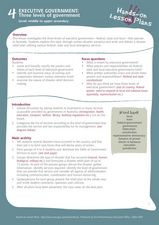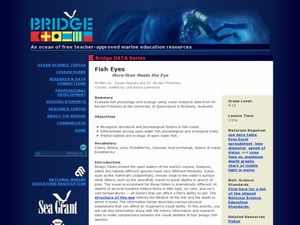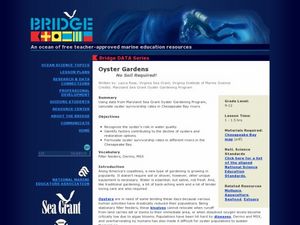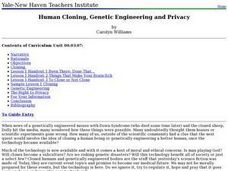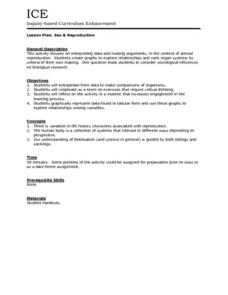Curated OER
Autism And The Brain
Help your class understand Autism. They conduct research into how the brain is effected by the disorder of autism. Then they write a letter to the Center For Disease Control about their findings and forward some of the new research to them.
Curated OER
Energy, Matter, and Organization
Tenth graders review the Energy, Matter, and Organization unit. They have one week to complete an essay. Students must submit a concept map or drawing. The activity is introduces by reading a short story line which presents a simple...
NOAA
Plankton
Dive into the world of plankton. The 17th installment of a 23-part NOAA Enrichment in Marine sciences and Oceanography (NEMO) program introduces different types of plankton. Young scientists then use what they have learned to classify...
Curated OER
DNA, the Awesome Thread of Life
Students examine how traits are passed to offspring. In this genetic reproduction lesson students develop a model of dna and learn about its structure, replication and function.
Curated OER
Toxicants and California Blackworms
Students determine the normal behavior of California blackworms. They determine how various concentrations of assigned toxicants affect the worm's behavior. Students are introduced to testing of potential toxicants, an important...
Curated OER
DNA Replication
Students are able to distinguish between transcription and replication. They are able to distinguish between DNA and RNA. Students name some of the proteins and enzymes used in replication and transcription. They are able comprehend the...
Curated OER
Box It Up
Students use a six-step problem solving method to design a box/container. They are given the criteria for evaluation when presented with the problem. Students keep a notebook on processes, procedures, material, cost, design, machines,...
Curated OER
Executive Government: Three Levels of Government
Students identify and classify the powers and responsibilities of all three levels of executive government in Australia. In this executive government lesson plan, students discuss the various services that the government in Australia...
Curated OER
THE CELL: DESIGN AND FUNCTION
After studying the structure and functions of living cells using textbooks, internet or encyclopedias, students prepare a PowerPoint presentation on cell structure and present it to the class.
Curated OER
Saving Sturgeon
Marine biology apprentices interpret data of sturgeon interaction with gill nets. They use the data to calculate the percentage of fish entangled in each twine size to discover if there is any correlation. This is a valuable exercise in...
Curated OER
Fish Eyes - More than Meets the Eye
Inform your class about the adaptations in fish eyes: cones, lens size, endothermy, and speed of vision. The adaptations are related to diving behavior. Junior marine scientists compare the adaptations of four different fish species to...
Curated OER
Blue Crabs - The Blue Crab's Chesapeake Journey
A plethora of information about the blue crabs of Chesapeake Bay will amaze and delight your marine biologists. They learn, through direct instruction, about the characteristics and life cycle of this fascinating arthropod. A highlight...
Curated OER
Chilean Sea Bass
Introduce your mini-marine biologists to using databases. Tables of how many Chilean Sea Bass were caught and number of hours spent fishing are examined. Using the data, individuals calculate the "Catch per Unit of Effort" for each year....
Curated OER
Oyster Gardens - No Soil Required!
Explore the practice of oyster gardening. Because oysters play a vital role in marine ecosystems and their populations have declined, biologists are transplanting oyster seed to repopulate reefs. After learning about this practice,...
Curated OER
The Scientific Method, Blood Typing, and Antibiotic Resistance
Students are given some components of an experiment, where they are able to identify and fill in missing parts, such as hypothesis, conclusion, results, etc. They form a hypothesis given general scientific facts. Students apply the...
Curated OER
Light and Starch Production in Photosynthesis
Students are given the unique opportunity to see the contrast between parts of a leaf that have photosynthesized and parts of the leaf that have not. This visual image helps students see the results of this biological process. At the...
Curated OER
Human Cloning, Genetic Engineering and Privacy
Review the aspects of human cloning and the moral issues associated with it. Individually, your students will keep a list of the articles related to this issue and research issues related to the ethic issues people are concerned with....
Curated OER
Measurement and Variation
Examine the concept of variation through observation and measurement. Middle schoolers will study a peanut and record any distinguishing characteristics visible as well as sketch their peanuts and describe them in writing. Their peanut...
Curated OER
Microbiology Lab Safety
In this biology worksheet, high schoolers are introduced to the practices of safety as related to using a laboratory and then answer some questions as an assessment.
Curated OER
Genetic Disorders
Students examine how living cells reproduce and how traits are passed on. In this genetic reproduction lesson plan students research a topic and present it to the class.
Curated OER
Molecular Approaches to Evolution
Students are introduced to working with molecular data. The first activity does both simulated and original data are used to compare amino acid, protein or DNA differences to construct phylogenetic trees or cladograms. These activities...
Curated OER
BLAST Algorithm
Young scholars explore a series of activities on using BLAST. In this biology lesson, students explain the significance of BLAST in DNA query. They give real world applications of BLAST.
Curated OER
How We Learn About the Brain: Teaching the Infant Brain
Students describe the development of an infant from conception to birth. In this biology lesson, students discover how a child's brain develop. They explain how children acquire motor and cognitive skills.
Curated OER
Sex & Reproduction
Students examine animal reproduction by interpreting data and making arguments and then create their own graphs to explore relationships of organ systems. This instructional activity includes an individual worksheet and a reflective...









